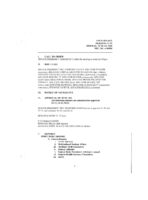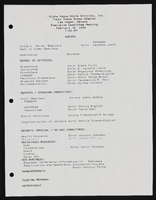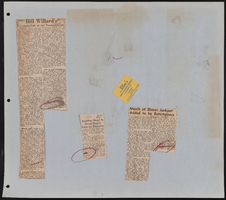Search the Special Collections and Archives Portal
Search Results

Anita Tijerina Revilla oral history interview: transcript
Date
Archival Collection
Description
Oral history interview with Anita Tijerina Revilla conducted by Marcela Rodriguez-Campo on October 09, 2018 for the Latinx Voices of Southern Nevada Oral History Project. In this interview, Revilla discusses her early life in San Antonio, Texas. She talks about her decision to make education a priority, figuring out the college application process on her own, and her initial interest in social justice. Revilla talks about how her critical consciousness was developed, and her pedagogical approach to teaching. Revilla describes her role in the 2006 May Day march, advocating advocating for the queer community, and disrupting oppressive systems to increase educational access for students. Lastly, Revilla discusses ethnic studies and the history of inequality in the United States.
Text

Meeting minutes for Consolidated Student Senate, University of Nevada, Las Vegas, June 14, 2004
Date
Archival Collection
Description
Text

Transcript of interview with Sandra Peña by Lada Mead and Stefani Evans, March 27, 2017
Date
Archival Collection
Description
Sandra Peña’s story begins in East Los Angeles, where she spent her first fifteen years with her parents (both from Michoacán, Mexico), and her younger sister. The father's managerial position at Master Products allowed the family to live rent-free in a company-owned house behind the main factory, because he collected the rents for the company's two other dwellings. In this interview, Peña recalls the family move to Porterville, in California's Central Valley, her return to Los Angeles at nineteen, and her work with Parson’s Dillingham, a contractor for the Metrolink rail system. She draws the link between the Los Angeles and Las Vegas construction communities by describing her husband's move to Las Vegas to find work; a chance Las Vegas encounter with a friend from Chino, California; her ability to gain employment in Las Vegas at Parson’s, a company that had joint ventured with Parson’s Dillingham, and her move from there to Richardson Construction, a local minority-owned company. As Peña says, "It's kind of all intermingled. Even if you go here and you go there, it's like everybody knows everybody." Throughout, Peña weaves her family story into the narrative as she describes her youth, the birth of her son, the illness and death of her father, and her family's participation in her current employment with Richardson. As she remembers the people, places, and events of her life, Peña speaks to the ways one woman of color built on her interstate construction connections and rose in a male-dominated industry.
Text

Alpha Kappa Alpha Sorority, Theta Theta Omega Chapter executive committee meeting agendas
Date
Archival Collection
Description
From the Alpha Kappa Alpha Sorority, Incorporated, Theta Theta Omega Chapter Records (MS-01014) -- Chapter records file.
Text
Lee Plotkin Papers
Identifier
Abstract
The Lee Plotkin papers document Plotkin's political work and associations as an LGBT activist and spokesman for the Las Vegas gay community, and include correspondence, press releases, copies of his columns, institutional and legislative documents, brochures, fliers and other ephemera from 1955 to 2006.
Archival Collection
John Janney Photograph Collection on Pioche, Nevada
Identifier
Abstract
The John Janney Photograph Collection on Pioche, Nevada contains photographs of mining operations and townspeople in Pioche, Nevada from 1908 to 1934. The photographs are primarily panoramic views of the town, mines, and landscape around Pioche, where Janney was president of Pioche Mines Consolidated until his death in 1967. The photographs also depict the baseball field in Pioche, a train crossing the desert in Lincoln County, and the Lee Family.
Archival Collection
Valerie Pida Trust Records
Identifier
Abstract
The Valerie Pida Trust Records (1987-1993) are comprised of records documenting efforts by Edward "Ted" Quirk, an attorney and a board member of the University of Nevada, Las Vegas (UNLV) Foundation, to establish a trust for Valerie Pida, a UNLV student who had battled Hodgkin's lymphoma since the age of thirteen. Pida was a student at UNLV from 1985 to 1991 and was a cheerleader for the Runnin' Rebels basketball team. The records include correspondence, newspaper clippings, financial statements, and receipts that document the establishment and activities of the foundation, which operated until 1993.
Archival Collection


